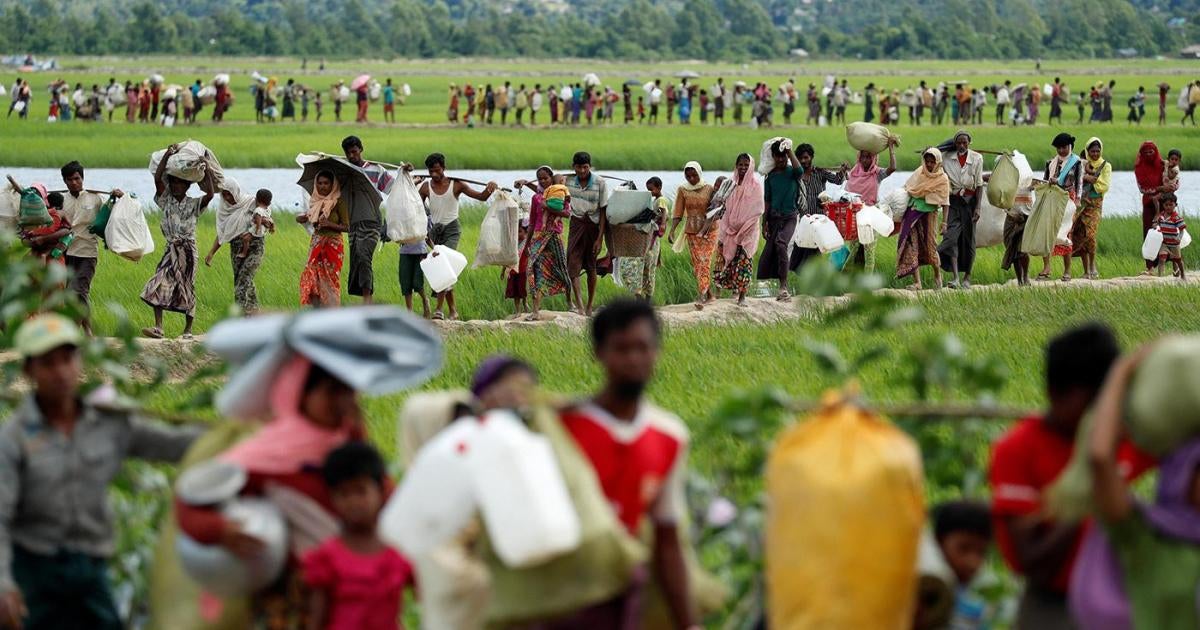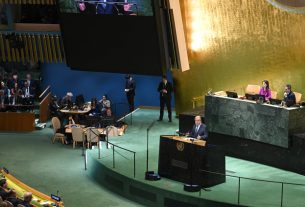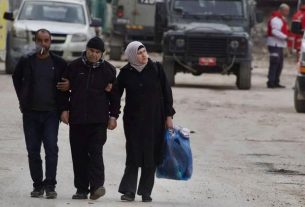(New York) – United Nations member states meeting on September 30, 2025, on the plight of Rohingya Muslims should commit to urgent action to protect them from persecution and violence, Human Rights Watch said today. Rohingya in Myanmar, Bangladesh, and across Asia continue to face grave threats to their safety, freedom, and lives.
The UN General Assembly is convening a High-Level Conference on the Rohingya “to propose a comprehensive, innovative and concrete plan for a sustainable resolution of the crisis, including efforts to create a conducive environment for the voluntary, safe, sustainable and dignified return of Rohingya.” Member states should highlight the serious threats to Rohingya in Myanmar and underscore that conditions for safe returns do not currently exist, particularly amid escalating conflict and abuses.
“The situation for Rohingya in Myanmar’s Rakhine State, where they are subject to apartheid and other crimes against humanity, remains dire,” said Louis Charbonneau, UN director at Human Rights Watch. “UN members should make clear at the conference that forcing Rohingya to return to Myanmar under these conditions would place their lives at risk and violate their rights.”
Since late 2023, Rohingya have been caught amid fighting between the Myanmar junta, which took power in a February 2021 military coup, and ethnic Arakan Army forces in Rakhine State. Human Rights Watch has documented grave abuses by all parties, including extrajudicial killings, widespread arson, looting, and unlawful recruitment. The Arakan Army, which now controls most of Rakhine State, has ramped up oppressive measures against Rohingya, including forced labor and arbitrary detention. Since early 2024, at least 150,000 Rohingya have fled to Bangladesh.
Rohingya refugees whom Human Rights Watch has interviewed want to return to their homes and lands, but only when they will be safe, free, and able to obtain Myanmar citizenship, which they have long been denied.
UN members should acknowledge that conditions for safe returns do not currently exist and oppose endorsing the immediate repatriation of Rohingya to Myanmar, Human Rights Watch said. They should instead condemn the Myanmar military and Arakan Army’s abuses against the Rohingya, support efforts for cross-border humanitarian aid, and pressure the Arakan Army to improve conditions and allow freedom of movement in areas under its control.
In Bangladesh, over one million Rohingya refugees living in the Cox’s Bazar camps are facing restrictions, aid cuts, and violence. Abductions, sexual violence, forced recruitment, and extortion by armed groups and criminal gangs has led to a pervasive climate of fear. The authorities have long enforced restrictions on education, livelihoods, and movement, denying Rohingya the tools to live with dignity and independence. With the influx of new arrivals and cuts to foreign aid, humanitarian organizations report an increasing strain on supplies including food, water, and medical assistance.
UN member states should commit to increasing funding to meet the needs of the refugee population and offer Bangladesh additional funding and support for host communities, conditioned on Bangladesh officials lifting restrictions on refugees and improving their living conditions. Governments should also commit to increasing resettlement opportunities or alternative visas, particularly for especially vulnerable or at-risk Rohingya refugees.
Despite accountability measures underway at the International Criminal Court (ICC) and International Court of Justice(ICJ), Myanmar’s military has yet to face adequate consequences for its atrocity crimes. The UN Security Council has failed to follow its December 2022 resolution on Myanmar with any tangible measures, while the junta’s unlawful attacks against civilians have only increased.
Upholding the human rights of the Rohingya as well as the entire population of Myanmar depends on the establishment of civilian democratic rule and achieving justice for the crimes by military commanders. The roots of the atrocities since the 2021 coup and the Rohingya crisis can be found in the military’s decades-long impunity.
Member states should outline targeted accountability measures to be taken against the junta for its refusal to comply with numerous international calls. Its deadly blockages of humanitarian aid, for example, contravene the UN Security Council resolution and the Association of Southeast Asian Nations (ASEAN) five-point consensus. The military has also blatantly disregarded the binding provisional measures ordered by the ICJ in a case under the Genocide Convention.
The conference can help build momentum for a follow-up Security Council resolution referring the country situation to the ICC and instituting a global arms embargo in line with the June 2021 General Assembly resolution on preventing arms sales to the junta. The council can also play a role in enforcing the provisional measures ordered by the ICJ.
“The UN Security Council should follow up on the conference by ending its silence on Myanmar and taking prompt, effective action,” Charbonneau said. “Building durable solutions for the Rohingya and addressing the root causes of the crisis depend on holding the Myanmar military accountable for its crimes.”



